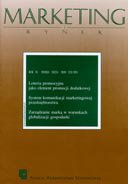Sharing economy in the behaviour of young people in an economic crisis
The main purpose of the article is to identify the determinants of the generation C consumers' (digital natives) behaviour in the sharing economy area under the crises influence, in particular the global economic crisis caused by the pandemic and then the outbreak of war in Ukraine. The research concept used in the article was based on literature studies on the essence of crises and their impact on the behaviour of young adults as well as qualitative research using the method of focus group interviews (FGI). The first part of the considerations presents the essence of economic crises, which have been an inseparable element of the market economy since the beginning of this economy. In the next part, attention was drawn to the key importance of the economic crisis of 2008 and the global recession in the dissemination of the idea of sharing economy in the world. Then, the results of qualitative research were presented. The obtained empirical material was subjected to the semantic field analysis. The result was the reconstruction of two definitions clarifying the perception of sharing economy phenomenon during the crisis. In addition, postmodern personality types based on Zygmunt Bauman's concept were identified. The use of focus group interviews and the semantic field method allowed to diagnose the perception of the phenomenon by the digital natives generation, as well as the characteristics of its representatives in the context of the postmodern man concept.
References
Bibliografia/References
Bauman, Z. (2011). Ponowoczesne wzory osobowe. Studia Socjologiczne, 1(200), 435–458.
Bochenek, M. (2012). Rozważania historyczno-semantyczne na temat kryzysów ekonomicznych. Acta Universitatis Nicolai Copernici. Ekonomia, XLIII(2), 148.
Business Insider Polska (2022). Jak wygląda współczesny cykl koniunkturalny? https://businessinsider.com.pl/gospodarka/makroekonomia/cyklkoniunkturalny-definicja-zastosowanie-okres-trwania/llbpk9f 352 (pobrano 27.12.2022).
Cho, S., Park, Ch. W., & Kim, J. (2019). Leveraging consumption intention with identity information on sharing economy platforms. Journal of Computer Information Systems, 59(2), 178–187. https://doi.org/10.1080/08874417.2017.1326295
Dillahunt, T. R., Xinyi, W., Earnest, W., Hao Fei, Ch., Brent, H., & Haiyi, Z. (2017). The sharing economy in computing: A systematic literature review. Proceedings of the ACM on Human-Computer Interaction, 1, 38: 1–26. https://doi.org/10.1145/3134673
Dornbusch, R. (2001). A primer on emerging market crises. NBER Working Paper No. 8326.
Dudkiewicz, M. (2006). Zastosowanie analizy pola semantycznego i analizy gloss dla zaprezentowania sposobu postrzegania świata społecznego. Przegląd Socjologii Jakościowej, 2(1), 33–52.
Dukaczewska-Nałęcz, A. (1999). Zogniskowane wywiady grupowe – jakościowa technika badawcza. W: H. Domański, K. Lutyńska, & A. Rostocki (Red.). Spojrzenie na metodę. Studia z metodologii badań socjologicznych. Instytut Filozofii i Socjologii PAN.
Ganapati, S., & Christopher, G. R. (2018). Prospects and challenges of sharing economy for the public sector. Government Information Quarterly, 35(1), 77–87.
Giddens, A. (2001). Nowoczesność i tożsamość (A. Szulżycka, Tłum.). Wydawnictwo Naukowe PWN.
Herodowicz, T., Hauke, J., Perdał, R. A., Nowak, A., Churski, P., Dominiak, J. A., Konecka-Szydłowska, B., Dolata, M. M., & Woźniak, M. (2018). Współczesne przemiany czynników rozwoju społeczno-gospodarczego. W: P. Churski (Red.), Teoretyczne i aplikacyjne wyzwania współczesnej geografii społeczno-ekonomicznej (67–88). Komitet Przestrzennego Zagospodarowania Kraju PAN.
Maison, D. (2001). Zogniskowane wywiady grupowe. Jakościowa metoda badań marketingowych. Wydawnictwo Naukowe PWN.
Mesjasz, L. (2009). Przyczyny kryzysów finansowych XXI wieku. Zeszyty Naukowe Uniwersytetu Ekonomicznego w Krakowie, (805), 127–141.
Nicińska, M. (2000). Indywidualne wywiady pogłębione i zogniskowane wywiady grupowe – analiza porównawcza. ASK. Społeczeństwo. Badania. Metody, 9, 39–50.
Nowak, G. (2022). Cykle Kondratiewa. Światowa gospodarka w cyklicznej zimie? Serwis Inwestora. https://www.amerbroker.pl/?go=content&action=show&id=352 (pobrano 27.12.2022).
Plewnia, F., & Edeltraud, G. (2018). Mapping the sharing economy for sustainability research. Management Decision, 56(3), 570–583. https://doi.org/10.1108/MD-11-2016-0766.
Robin, R. (1980). Badanie pól semantycznych. Doświadczenia Ośrodka Leksykologii Politycznej w Saint-Cloud. W: M. Głowiński (Red.), Język i społeczeństwo (205–282). Czytelnik.
Rutkowska-Podołowska, M. (2016). Kryzys gospodarczy i jego wpływ na zrównoważony rozwój. Ekonomia i Środowisko, (1), 10–21.
Sagan, A. (2004). Badania marketingowe. Podstawowe kierunki. Wydawnictwo Akademii Ekonomicznej w Krakowie.
Schumpeter, J. A. (1939). Business Cycles. A Theoretical, Historical and Statistical Analysis of the Capitalist Process. McGraw-Hill Book Company.
Sińczuch, M. (2014). Obraz weteranów w mediach na podstawie analizy wybranych publikacji internetowych. Bezpieczeństwo. Obronność. Socjologia. (2), 54–60.
Sujecka, K. (2020). Cykle Kondratiewa po II wojnie światowej. Kryzysy XXI wieku. Zeszyty Naukowe Państwowej Wyższej Szkoły Zawodowej w Płocku. Nauki Ekonomiczne, (32), 93–109.
Szymańska, A. I. (2017). Sharing economy jako nowy trend w zachowaniach konsumentów. Marketing i Rynek, (9/CD), 417–425.
Szymańska, A. I. (2022). Sharing economy w okresie pandemii COVID-19 – analiza pola semantycznego. Prace Komisji Geografii Przemysłu Polskiego Towarzystwa Geograficznego, 36(4),132–147. https://doi.org/10.24917/20801653.364.9
Świrski, K. (2022). Znowu nadchodzi kryzys? http://konradswirski.blog.tt.com.pl/znowu-nadchodzi-kryzys/ (pobrano 28.12.2022).
Worek, B. (2001). Analiza wyników zogniskowanych wywiadów grupowych w badaniach marketingowych. ASK. Społeczeństwo, Badania, Metody, (10), 25–47.

